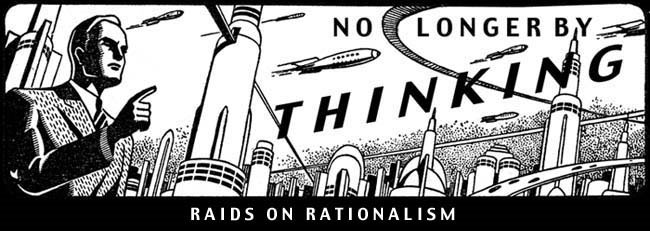If I was Bogart, I’d be reaching for my whiskey right now. Because they’re playing that song again. I’ve heard it so many times, so many damn times, and every time I hear it I want to reach for my whiskey. Not because I'm tortured by memories of love in Paris before the invasion, but because the song is so sadly, brightly, inanely, insanely dumb.
It goes like this: space travel has made spectacularly visible the glorious fact that the world is one place, our single shared big-blue-marble home, and that boundaries are cultural fictions. This realization promotes world peace by making nationalisms seem arbitrary. In some versions of the lyric, photographs alone work the magic: in others, only personal, in situ experience of the vision suffices.
Rusty Schweickart, Apollo 9 astronaut, has eloquently described a personal epiphany of this type during his 1968 mission to Earth orbit. In his essay “No Frames, No Boundaries,” he recounts looking down on the Middle East as he skimmed high above, marveling that “hundreds of people [are] killing each other over some imaginary line that you're not even aware of, that you can't see.”
This week the BBC reports gushingly on the latter-day fruits of Schweickart 's epiphany:
Forty years on, as Schweickart approaches his 74th birthday, we are on the brink of an opportunity for his wish to come true, as commercial teams around the world race to launch the first suborbital tourist flights.
These new aerospace pioneers, striving to bring us space tourism today, were young impressionable children and teenagers during the 1960s -- inspired to take up their careers, in part, by the Apollo programme.
If these "children of Apollo" succeed, then they may give us the chance to launch those leaders locked in conflict around the world on their own epiphanal flights above the Earth.
For only then, as Schweickart pointed out, will they truly appreciate that we are one people on one planet - "riders on the Earth together".
Where’s that whiskey? It’s all so empty, my God, so empty . . . “Only then will they truly appreciate . . .”
People said the same thing about airplanes, you know, almost a hundred years ago. From the sky, we can all see at last that national borders are often not coincident with large-scale geological features such as rivers! World peace is at hand! Well, it wasn’t. Damn it, you can see from 10 feet away that any dryland national border is artificial: you don’t need to stand back 100 vertical miles and squint. Lack of opportunities to see the obvious isn’t what keeps the world crazy.
People are killing each other in the Middle East over grave injustices, colonial bids for wealth and acreage, water rights, petroleum, insane nationalist or religious hatreds -- good reasons, bad reasons, you name it -- but almost never for “an imaginary line” as such. Almost never for motives that could be obliterated by a tearful rush of zero-G oceanic feeling. Which is why so very few astronauts have, in fact, become emissaries of internationalism (they have taken up a great diversity causes, from Noah’s Ark to attempted murder of romantic rivals, but rarely that one) and why launching several score politicians and dictators briefly into orbit would have no significant impact on world affairs. One-way shipment might, I admit, produce a temporary benign effect.
And one of the biggest reasons that people are suffering and dying in droves down here on the good Earth, as novelist Pearl Buck and Apollo 8 astronaut Frank Borman both called it, is inequality. Here is poverty like a sad brown sea, wealth bobbing merrily on its surface like a gilded cork. And what is space tourism, Schweickart’s proferred salvation, but the ultimate joy-toy of the rich? Ninety-nine point however many nines you care to write down percent of Earth’s billions, me included, will never make an arcing trip to the official 62-mile (100 km) edge of “space” -- the Kármán line, one imaginary border that seems strangely important to the would-be space-tourist industry -- much less orbit the Earth or fly to the Moon. We are stuck here, for good and ill. That is a material, mechanical fact as certain as gravity: it is gravity, or one of its consequences. This ground underfoot is our heaven or our hell. And every time that some dizzy fool acquires more unearned wealth and then invests it in a nonproductive, hyperpolluting joyride to nowhere, whether on a 747 or a Spaceship One, we inch a micron closer to hell.
That’s one giant leap for a man, one small step backward for mankind.
On second thought -- play it, Sam. If they can take it, I can take it . . .
-






No comments:
Post a Comment